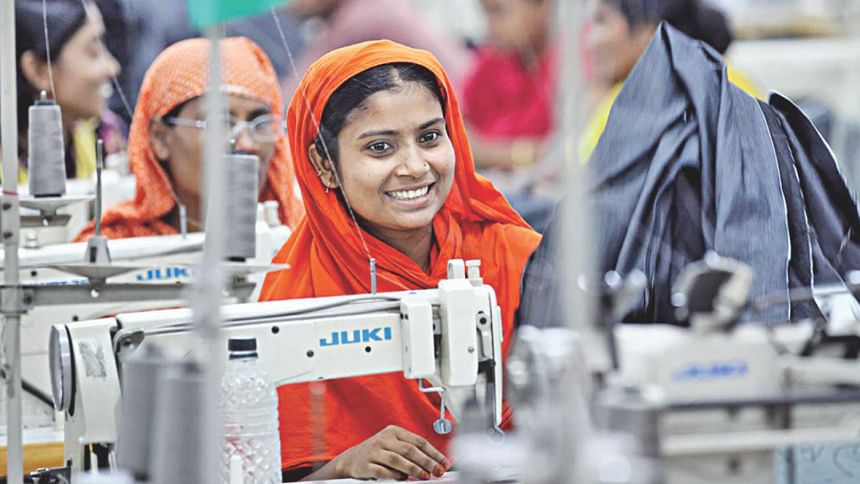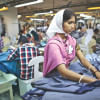For further growth of our RMG

Since its foundation, the Bangladesh Ready-Made Garment (RMG) sector has enjoyed rapid expansion, reaching an audience of international buyers and contributing to 83 percent of per annum exports, employing some 4.4 million people, and contributing over USD 32 billion to the economy. One would expect a sector of the nation's economy that is performing so well and contributing so much to the benefit of the nation to be widely supported. But a look at the support offered in terms of the education of our next generation of skilled workers, designers, merchandisers, product developers and factory managers shows that it is woefully lacking today.
It is a sorry state of affairs when, given the importance of the RMG sector to our nation, there is not one single item on the curriculum of our schools and colleges pertaining to the RMG industry and, furthermore, there is only one public university (from the 39 public universities that exist) offering education on the textile industry. A handful of our private and public universities offer courses on textile or industrial engineering. The University of Fashion and Technology, established by the BGMEA in 2012, is the only fashion orientated educational establishment in the country offering support to an industry of such vast financial importance to our nation and the largest sector of employment for the country.
It seems fair to say that there exists a significant disconnect between the education being provided to our young generation and what the RMG industry actually requires in terms of new blood to both bolster our existing RMG business and, more importantly, help to develop the industry for the future. One only has to look at the substantial number of disaffected graduates, seeking to find work in the industry, and the considerable number of expatriates being employed on high salaries in Bangladesh, to realise that the pool of human resources required to drive our thriving RMG sector is not up to the task in hand.
Whilst the above comments do not paint a pretty picture for the future of the RMG industry of Bangladesh, there are a number of ways that we can improve the situation over a period of time—but, there is no short-term fix, and the necessary transition will require investment and support from the government, NGOs and from within the RMG industry itself.
The first issue to consider is the level of education provided at secondary and college levels that deals with the requirements of the RMG industry. Given the importance of the sector and the varied opportunities that it can offer, particularly to female employees (who constitute about 70 percent of the RMG workforce) and the empowerment that it can bring, it would be logical to introduce an educational programme with relevance to the RMG industry, drawing attention to its importance to the nation's economy and the opportunities that are offered across the sector. Surely, it would be possible to incorporate a syllabus within our education system that highlights the benefits of a career within the RMG industry and the vast array of roles that are available?
Another approach to consider is the foundation of incubation centres, a model that is being successfully championed at many universities in the developed countries. Programmes at the university incubation centres combine world-class education, incubation and global opportunities in entrepreneurship, innovation and product management. Such programmes offer networking and support for start-up businesses, encouraging young entrepreneurs to hone their craft with the guidance of experienced professionals and a network of their peers.
This form of education purposefully challenges chosen business practices, encouraging students and start-up businesses to innovate and "think outside of the box." This approach is something that we as an industry and the government and other interested parties need to consider.
While the establishing of incubation centres in Bangladesh may seem to be a long way from happening, we need to encourage greater dialogue and interaction between academia and the RMG sector. The apparel industry needs to be more active in the promotion of the vast array of career opportunities available to our younger generations, and the academic community needs to establish a system that provides education to graduates that is relevant to the RMG industry, starting with the provision of basic training in the fundamentals of the sector and explanation of the levels involved, from factory floor worker, to merchandiser, designer, product developer and beyond. This will give students the opportunity to make an informed decision about their future career choices and participate in the necessary training for their chosen career path.
This approach will necessitate involvement and funding from the government and educational bodies and, most importantly, participation from industry leaders from the RMG sector to ensure that any changes to the curriculum provide the correct level of relevant education and advice to students. We need to see this as an investment for the future of the nation's RMG industry. Developing an educational system that can provide the necessary skill-sets to students will allow the industry to compete at higher market levels and will address the need for competent middle management.
In order to take the process of integration between the RMG industry and the educational system one step closer, we should also consider the practice of establishing a programme of internships and apprenticeships within the industry.
Our industry faces many challenges in the years ahead and we need to prepare ourselves for the next phase of the RMG sector's evolution. I firmly believe that addressing the educational gap that currently exists will help during these challenging times.
Mostafiz Uddin is the Founder and CEO of Bangladesh Apparel Exchange (BAE) and Bangladesh Denim Expo. He is the Managing Director of Denim Expert Limited. He can be reached at [email protected].









Comments